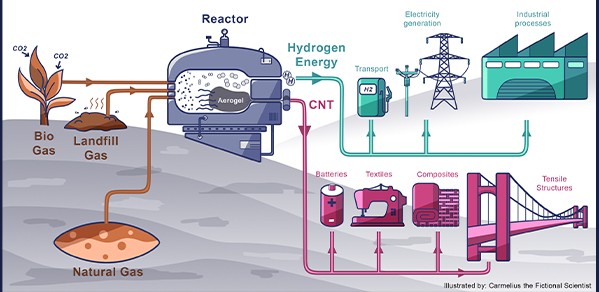
Cambridge engineer Professor Adam Boies has been announced as a co-investigator of a new international partnership set up to make low-cost, large-scale, net zero hydrogen production a reality.
Our goal is to make carbon materials more valuable than heat and CO2, thus providing the incentive for low CO2 materials as well as turquoise hydrogen to replace grey hydrogen for the hard-to-decarbonise sectors.
Professor Adam Boies
The Global Hydrogen Production Technologies Center (HyPT) is a £14.1 million five-year project led by Cranfield University, Arizona State University, the University of Adelaide and the University of Toronto. The University of Cambridge is a founding member in the UK, alongside Imperial College London, Newcastle University and the University of Birmingham.
The HyPT seeks to accelerate net zero hydrogen technologies to make it available at low cost – approximately one dollar per kg of hydrogen. Net zero hydrogen enables decarbonisation of many energy-intensive and hard-to-abate industries such as ammonia, steel, cement, aluminium, transportation and energy storage.
Professor Boies’ contribution will be in turquoise hydrogen production. Turquoise hydrogen is made using a process called methane pyrolysis, which results in carbon, instead of the CO2 produced by blue hydrogen.
“Here at Cambridge, we are excited to contribute our efforts to jointly making functional carbons alongside hydrogen,” he said. “Our goal is to make carbon materials more valuable than heat and CO2, thus providing the incentive for low CO2 materials as well as turquoise hydrogen to replace grey hydrogen for the hard-to-decarbonise sectors.”
He added: “This project provides a unique opportunity to collaborate with the top researchers internationally, developing and scaling these technologies for global impact in the energy and materials transition.”
Large-scale hydrogen production with net zero emissions of greenhouse gases is essential to meet the Paris Agreement’s climate targets and limit global warming to 2˚C. However, net zero hydrogen is currently several times more expensive than hydrogen produced from fossil fuels, which hinders its widespread adoption.
HyPT seeks to develop three major net zero hydrogen production technologies:
- Water electrolysis, where electricity is used to split water into oxygen and hydrogen.
- Methane pyrolysis, where a natural gas is heated to a high temperature and then splits into hydrogen and solid carbon.
- Photocatalytic solar water splitting, where sunlight is used help water break apart into oxygen and hydrogen.
HyPT will develop breakthroughs in these technologies, while assessing its impacts on local communities and ecosystems, so that the net zero hydrogen economy can develop in an ethical manner.
Nazmiye Ozkan, Professor in Sustainable Energy Transitions and Head of the Centre for Energy Systems and Strategy at Cranfield University, is the UK lead for the project.
She said: “HyPT is a transformative international collaboration dedicated to driving the development of a sustainable hydrogen ecosystem. Our mission is to unlock the potential of net zero hydrogen production, making it an accessible and affordable energy source.
“What is crucial is that this initiative will not only advance cutting-edge hydrogen technologies, but also address the economic and policy dimensions that are essential to developing a global hydrogen economy.”
UK Research and Innovation (UKRI) has distributed £6.2 million of funding to UK HyPT partners through its Building a Green Future fund and International Science Partnerships Fund.
Dame Ottoline Leyser, UKRI CEO, said: “UKRI’s Building a Green Future Programme aims to harness the power of research and innovation to tackle hard-to-decarbonise sectors in our economy. We are excited to be partnering with our sister organisations in the US, Canada and Australia to accelerate progress toward this crucial goal.
“Our combined investment in Global Centers enables exciting researcher and innovation-led international and interdisciplinary collaboration to drive the energy transition. I look forward to seeing the creative solutions developed through these global collaborations.”
Adapted from a Cranfield University press release.

